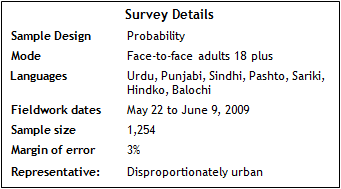Results for the survey are based on face-to-face interviews conducted May 22 to June 9, 2009. The survey in Pakistan is part of the larger 2009 Pew Global Attitudes survey conducted in 24 nations and the Palestinian territories from May 18 to June 16, 2009, under the direction of Princeton Survey Research Associates International. (For more results from the 25-nation 2009 poll, see ”Confidence in Obama Lifts U.S. Image Around the World,” released July 23, 2009.)
The table below provides details about the survey’s methodology, including the margin of sampling error based on all interviews conducted in Pakistan. For the results based on the full sample, one can say with 95% confidence that the error attributable to sampling and other random effects is plus or minus the margin of error. In addition to sampling error, one should bear in mind that question wording and practical difficulties in conducting surveys can introduce error or bias into the findings of opinion polls.

The sample covers roughly 90% of the adult population. All four provinces of Pakistan were sampled excluding areas of instability in the North West Frontier Province (NWFP) and Baluchistan. Instability also made it impossible to survey the Federally Administered Tribal Areas (FATA), Federally Administered Northern Areas (FANA), and Azad Jammu and Kashmir (AJK). The sample is disproportionately urban due to the greater heterogeneity of the urban population. The sample is 55% urban while Pakistan’s population is roughly 33% urban. Data are weighted to reflect the actual urban/rural split in Pakistan.




